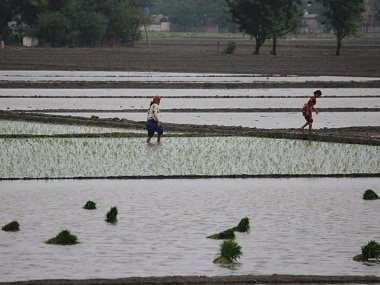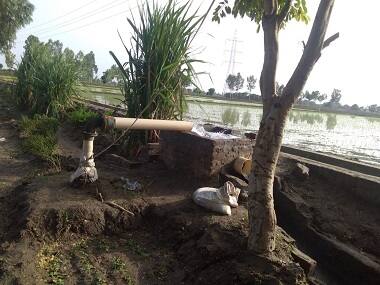Editor’s note: Punjab’s priority for paddy has not been an entirely favourable business for the state’s agriculture. This series examines the potential threat to the sector from skewed paddy cultivation, challenges faced by small cultivators, and the alternatives available on the field. Chandigarh: Two years ago, Charan Singh’s tubewell ran dry just before the paddy-sowing season could start. The rice farmer, who cultivates four acres of land in the Mansa district of Punjab, had been pumping water from 45 feet below the surface. Now he had to dig another, deeper well. Like Charan Singh, 36, thousands of farmers across Punjab are astonished at the speed at which groundwater, their principal source of water for irrigation, is running out. Tubewells, operated with electric water pumps, are being dug ever deeper in search of a secure source of water. The cost of digging a borewell could be anything from Rs 75,000 to over Rs 1.50 lakh. Farmers in Punjab had traditionally followed a corn-wheat or sugarcane-corn-wheat cropping pattern. But during the Green Revolution in the 1960s, they shifted to a wheat-rice pattern, which led to an increased demand for irrigation water. The indiscriminate use of groundwater for the water-guzzling paddy crop is the principal reason precious groundwater ran dry, say experts. [caption id=“attachment_4619951” align=“alignleft” width=“380”]  Paddy being planted in fields in Sangrur. Image courtesy: Firstpost/Savinder Singh[/caption] Anoop Nagar, director of the Central Ground Water Board’s (CGWB) northwest region, says there are areas in Punjab where water is depleting at the rate of four metres per year. “The rate of depletion is different in different parts of the state. While it’s four metres per year in some areas, it could be two metres in other areas. But the decline is rapid everywhere and we need to check it urgently,” he said. Punjab has a land area of 50,362 sq.km, which constitutes 1.57 percent of the country’s total area. Yet, the state contributes over half the grain procured by the central government each year. About 84 percent of the state’s geographical area is farmed. Punjab’s over-dependence on agriculture is down to its geography and topography; it straddles the Indus river basin and is drained by three major rivers — the Ravi, Beas and Sutlej, apart from other streams, including the Ghaggar, which drain the southern parts of the state. According to the Commission for Agriculture Costs and Prices, Punjab requires 5,337 litres of water to grow one kilogram of paddy, double of what’s required in West Bengal (2,605 litres), a natural habitat of the crop. As PR Reddy, a former scientist with the National Geophysical Research Institute (NGRI), observed, “Neither a native plant nor suited to the agro-climatic region, paddy has pushed out maize and cotton, which were common in the pre-Green Revolution era. From 2.27 lakh hectares in 1960, the area under paddy rose to 26.12 lakh hectares by the year 2000; a growth rate of 1,050 percent.” The area under paddy cultivation had increased to 30.46 lakh hectares in 2016-17. Free electricity provided to farmers by the state government contributes in no small measure to the problem. Moreover, farmers say there has been little or no effort or encouragement by the state government to get them to look beyond the wheat and paddy cycle. Senior journalist PPS Gill agreed that Punjab was never suited to growing paddy. “There needs to be a study on how the area under paddy grew manifold within a few years. There needs to be a study done on whether the increase in area of paddy in Punjab was due to free electricity provided by the state government to the farmers. Also, there is a need for growing high-value and low-volume crops rather than high-volume and low-value crops in the state,” Gill said. Punjab passed the ‘Punjab Preservation of Subsoil Water Act’ in 2009, which prescribed specific dates for farmers to sow nursery plants and to transplant the paddy plants into the fields. This was done to ensure that the paddy plants get enough water from the monsoon rains and there’s no additional pressure on groundwater. The government fixes the date depending on the arrival of monsoon. [caption id=“attachment_4619971” align=“alignright” width=“380”]  Water being pumped into the field in Mansa district. Image courtesy: Firstpost/Navdeep Ahluwalia[/caption] The central and state governments are both worried about the rate of groundwater depletion. A survey by the Punjab soil and water conservation department notes that water demand for “agricultural purposes is 43.7 lakh hectare metres, while the excess demand of 12.4 lakh hectare metres is met through over-exploitation of groundwater resources. Today, there are 12.32 lakh tubewells as compared to 1.92 lakh in 1970-71… the percentage of net area irrigated to net area sown has shown a tremendous increase from 71 percent to 97.4 percent during 1970-71 to 2006-09. Out of the total irrigated area, the area under irrigation by groundwater through tubewells has increased from 55 percent to 73 percent.” Free power, favourable policy A report by the Punjab State Farmers and Farm Workers Commission said the state policy of free power for agriculture, in combination with a central policy favourable towards paddy cultivation, paved the way for indiscriminate use of groundwater that resulted in 110 out of 148 blocks being over-exploited. “The situation has reached a critical stage and a shift from existing practices is necessary to ensure that the next generation has adequate natural resources. A region-specific primary ecological constraint has emerged in the form of falling water table. There is a dire need to diversify away from paddy. On the economic front, the returns from agriculture are not keeping pace with other sectors. A shift to higher value agriculture is generally advocated,” the report concludes. But there are some who feel that paddy per se isn’t the problem, just the varieties grown. Gurjit Singh Mangat, head of the department of plant breeding and genetics at Punjab Agricultural University, Ludhiana, said many new varieties of rice have been introduced in the market by the varsity that mature within 110 to 105 days after transplantation into fields. For example, PR121 takes 110 days while PR124 takes only 105 days to mature. “While the yield of rice is increasing with these new varieties, they are consuming less water as compared to the old varieties of rice,” says Mangat. Either way, Punjab, Haryana and the National Capital Region (NCR) are all dependent to an alarming degree on one of the fastest depleting aquifers in the world. These warnings haven’t come a day too soon. Also read: Part 2: High-cost farming is degrading quality of soil, driving small farmers to ruin Part 3: State’s farmers discover there is life beyond rice and wheat, take to animal farming, fishery The author is a Punjab-based freelance writer and a member of 101Reporters.com, a pan-India network of grassroots reporters.
Punjab’s priority for paddy has not been an entirely favourable business for the state’s agriculture. This series examines the potential threat to the sector from skewed paddy cultivation
Advertisement
End of Article


)

)
)
)
)
)
)
)
)



